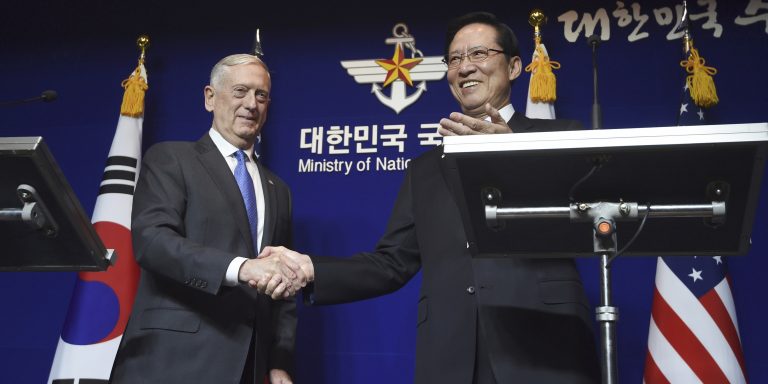INTELBRIEF
October 30, 2017
TSC IntelBrief: A Contradiction in U.S. North Korean Policy

• During an October 27 visit to South Korea, U.S. Defense Secretary James Mattis called for a Korean Peninsula free of nuclear weapons.
• Unlike deterrence, denuclearization would require North Korea to give up what it considers to be its strongest defense against the threat of regime change.
• Some official U.S. statements fail to reflect the fact that North Korea has possessed a robust nuclear weapons program for more than a decade.
• With rhetoric and shows of force, the U.S is trying to bring Pyongyang to the negotiating table without going too far as to provoke a military response.
On October 27, amid rising tensions between Washington D.C. and Pyongyang, U.S. Defense Secretary James Mattis visited South Korea. The visit was meant to show a unified front between Washington and Seoul, in the ongoing confrontation with North Korea over its nuclear weapons and ballistic missile programs. Standing at perhaps the world’s most definitive border, the de-militarized zone (DMZ) between the two Koreas, Secretary Mattis called for ‘the complete, verifiable and irreversible denuclearization of the Korean Peninsula.’ Secretary Mattis’ call was consistent with some statements U.S. officials have made on North Korea’s nuclear program, while contradicting others. The North Korean crisis finds the U.S. bouncing somewhat unpredictably between deterrence and denuclearization; two very different national-security policy goals with very different approaches and likelihoods of success.
Since taking office, President Donald Trump has tweeted or stated several times that the U.S. would not allow North Korea to possess nuclear weapons — despite the fact that North Korea first tested a nuclear device in 2006. To date, Pyongyang has tested nuclear devices six times, including a thermonuclear test in September 2017. Pyongyang’s successful pursuit of an effective nuclear weapons capability has hardly been clandestine; the country touts every advancement as a way to ensure its survival while also threatening to destroy the United States. Such hyperbolic taunts become more real with each successful North Korean ballistic missile test; the U.S. is deeply concerned with those advances as it works to properly asses the threat.
The fact that Pyongyang became a nuclear power, after a long and openly stated commitment to do just that, makes calls for the ‘irreversible denuclearization’ of North Korea problematic at the very least; certainly, in terms of achieving that goal diplomatically. In addition, the Kim Jong-Un regime undoubtedly recalls the fall of the Gaddafi regime, after Libya gave up its nascent nuclear program, and is witness to the latest U.S. threats to walk away from its multi-lateral nuclear agreement with Iran. Given those realities, the idea that North Korea’s ruling regime would surrender what it considers to be the prime deterrent factor preventing the U.S. from removing it from power, is unrealistic. In geopolitical conflict resolution at this level, presenting one’s adversary solely with unrealistic demands is a recipe for frustration and even disaster.
The U.S. is caught between two mutually exclusive policy stances: deterring a nuclear-armed North Korea, while somehow forcing Pyongyang to get rid of its nuclear weapons. The issue with deterrence is that North Korea’s dangerous rhetoric can no longer be dismissed as cartoonish propaganda, because despite warhead re-entry and targeting issues, its improving ballistic missile delivery capability is very much a reality. Deterrence is difficult to maintain when one party with a credible nuclear weapon regularly threatens to use it against another. (While the U.S. and the former Soviet Union avoided mutually assured destruction despite engaging in periodic confrontations for decades, they also came to the brink of war during the Cuban Missile Crisis in 1962 and had other, lesser-known, scares.)
The U.S is trying to bring North Korea to the negotiating table with rhetoric and shows of force, without going too far as to provoke a military response. However, Pyongyang might very well see U.S. statements calling for denuclearization as warnings regime change could follow, if it fails to acquiesce. A U.S. pre-emptive strike on the Kim regime is — hopefully — unlikely, given a lack of military options that wouldn’t result in the destruction of Seoul, a city of nearly ten million people. Meanwhile, U.S. diplomatic stances that waver between deterrence and denuclearization are keeping the nuclear issue at a boil; precisely the opposite goal if Washington hopes to set the stage for effective negotiations.
.
For tailored research and analysis, please contact: info@thesoufancenter.org
.
.